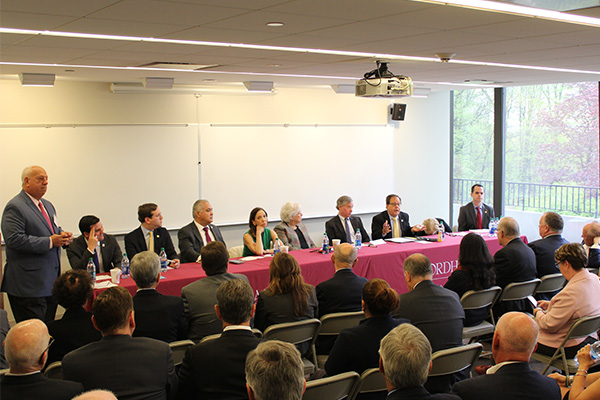
Westchester’s state legislators were served a buffet of concerns about issues impacting business during a breakfast forum held by the Hudson Valley Economic Development Corp./Westchester County Association on May 3 at Fordham University’s campus in West Harrison.
Not the least of the concerns was the current effort in Albany to pass legislation that would require the developer of any project receiving government funds to pay workers the equivalent of prevailing union wages and benefits. The current push for a single-payer health care insurance system in New York state and legislation that would require golf courses be taxed at the highest possible commercial value also were scrutinized.
Nick Spano, a 28-year veteran of both the State Assembly and State Senate, who now operates lobbying firm Empire Strategic Planning, moderated the event. Attending were State Assembly members Kevin Byrne, David Buchwald, Amy Paulin, Nader Sayegh, Steven Otis, Tom Abinanti and Sandy Galef. Senators Shelley Mayer and David Carlucci participated, as did Senate Majority Leader Andrea Stewart-Cousins.
Spano began by asking Galef about legislation that would change the way property taxes on golf courses are figured. Galef (D-Ossining) chairs the Assembly Committee on Real Property Taxation. She introduced legislation in the Assembly that would base the property tax assessment of golf courses on a property’s “highest and best use.” Carlucci, a Democrat representing parts of Rockland and Westchester, has introduced the Senate version of the bill.
A prime example of why they’re pushing the legislation is found in President Donald Trump’s Trump National Golf Club Westchester in Galef’s district. On Trump’s federal financial disclosure forms, he valued the golf club at $50 million. The local property tax assessment values the golf club at $14 million. Trump’s lawyers have been seeking a property tax reduction and claim the property is worth only $1.5 million.
“There’s actually a condo on the property that is up for sale for $1.4 million, so you can see how this is just out of kilter,” Galef told the forum. She warned that if golf courses manage to slash their property taxes, businesses and all other property owners will have to make up what’s lost.
“You’re going to pay for people to play golf,” she said. “My whole issue is equity and fairness in our taxation.”
Otis (D-Rye) said that the Galef/Carlucci legislation doesn’t take into account that golf clubs have various business models.
“You have membership golf courses that have restaurants and bars, you have golf courses that don’t,” Otis said. “You have golf courses that are clubs theoretically but really are owned by a partnership or individual.”
He said that although the issue needs action, “I’m not sure if Sandy’s bill is the right approach.”
Paulin (D-Scarsdale) warned that jobs may be directly related to golf club finances and that the clubs often employ some of an area’s poorest residents, many of whom may be immigrants.
“We have to be very careful about where we go with this,” Paulin said. Trump’s Westchester golf course is under investigation along with other Trump properties for allegedly knowingly employing illegal immigrants.
What’s definitely going somewhere, according to Mayer (D-37th Senate District), is legislation that would classify any development receiving government aid as a public works project and require the developer to pay workers the equivalent of prevailing union wages and benefits. The aid could be anything from an outright grant or subsidy to a tax break from a local Industrial Development Agency (IDA). A primary effect would be to remove any financial incentive for a developer to use nonunion labor on a project.
“In this room, nobody paid much attention when the Senate was controlled by Republicans because the bill wasn’t going to move,” Mayer said, “and although I made clear to my allies and friends in the business community and elsewhere that I was very open for discussion, no one wanted to discuss it.”
However, she continued, with the Democrats controlling the Senate and Assembly, “I do think a bill’s going to pass, so I encourage everyone to come to the table and try to find a common ground.”
She indicated that an exception could be made for affordable housing projects, since costs to build those must be kept low or they won’t be affordable.
Attorney Mark Weingarten, whose practice includes representing developers, explained to the panelists that the issue is not paying someone a living wage, because even unskilled nonunion laborers on a construction job often are making substantial wages of $25 or $30 an hour.
“The issue has boiled down to, effectively, what’s the benefit package?” he said.
Weingarten noted that while union carpenters in Westchester are earning $52 an hour, “They also get $53 an hour in supplemental benefits, 100% of their hourly wages.” Weingarten said that in many private businesses, 25% of wages is considered a substantial benefits package.
Kevin Plunkett of Simone Development Companies reminded the legislators that the IDA in Yonkers implemented a policy requiring prevailing wages to be paid on any project receiving IDA benefits. “Not one developer came in seeking incentives from that IDA,” he said. “What is the impact on development? I understand they removed the policy.”
Paulin said that she has withdrawn her support for the current prevailing wage legislation because of the widespread belief that it would bring an end to the current level of development activity. Paulin was an early sponsor of the prevailing wage bill in the Assembly.
“I have removed my name this year because I have understood from my communities — and these are Democratic communities, these are communities that are desperate to do the right thing by the workers — and I have understood from them that a lot of these projects would not happen,” she said.
“We would not see development in New Rochelle, for example … so I have a lot of reservations now at this point and I look forward to more conversations and to being educated on specifics,” Paulin declared.
Debate on a single-payer health care system for New York has been heating up with renewed efforts by the Trump Administration to kill the federal Affordable Care Act. With the Democrats now in control of both houses in Albany, single-payer is being talked up even though it is not clear whether Gov. Andrew Cuomo would support it as a state program — although he says it is the way to go at the federal level. While single-payer was approved in the past by the Assembly, it never stood a chance of passage in the Republican-controlled Senate.
“I invite those in the health care field to really reach out and communicate and tell just how you feel about single-payer plans,” Sayegh (D-Yonkers) said.
Byrne (R-Putnam County), whose district includes Yorktown and Somers, explained that he has a medical background having worked for the American Heart Association and CareMount Medical.
“When it comes to single-payer, it’s something I have strongly opposed,” he said. “I don’t think you can say this is the silver bullet that’s going to solve our health care problems.”
Byrne noted that the estimated cost of $200-250 billion for a single-payer plan in New York state would be well over the entire state 2019-20 budget of $175 billion.
Stewart-Cousins, who became Senate majority leader in January, used the event to continue pushing back against Cuomo’s claim that she helped kill the Amazon deal to build a second headquarters in Long Island City when she nominated outspoken Amazon opponent State Sen. Michael Gianaris to the Public Authorities Control Board, which had the power to veto the deal.
She contended that it was Amazon that made the decision to pull out, and that any problems she had concerned the process, not the deal itself.
“Anything that can go on for almost two years without the input of the local community, without the input of the local elected officials who actually represent that community, and be announced, is a bad process,” she said.

















